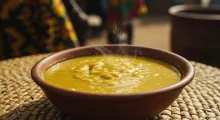Bazeen is one of Libya's most iconic and traditional dishes. Its unique texture and ceremonial presentation make it an emblem of Libyan identity. It is often enjoyed during national celebrations, family reunions, and communal feasts.
Origins and Cultural Context Bazeen has deep Berber and Arab roots, reflecting Libya's multicultural culinary heritage. In traditional households, it is a dish of honor, often prepared by grandmothers and mothers to mark special events.
Key Components
- Bazeen dough: made from barley flour, water, and a touch of salt
- Lamb stew: cooked with tomato paste, potatoes, chili, and garlic
- Boiled eggs
- Olive oil and sometimes harissa (spicy paste)
Cooking Method The bazeen dough is made by gradually adding boiling water to barley flour and kneading it vigorously until it forms a firm, elastic mass. This is then molded into a dome shape at the center of a large serving dish.
The lamb stew is prepared separately, rich in spices and slow-cooked to tender perfection. It includes potatoes, tomato paste, and sometimes pumpkin or carrots. The stew is poured around the bazeen mound, and boiled eggs are placed decoratively.
Flavor and Texture Profile The dough has a chewy, dense consistency with a neutral taste that absorbs the rich, spicy, and savory flavors of the stew. The lamb is tender and the broth is hearty, making each bite a satisfying experience.
Symbolism and Serving Style Bazeen is typically eaten communally with hands, reinforcing familial bonds and social cohesion. The act of sharing from the same platter is a ritual of unity and respect.
Health Aspects Barley is high in fiber and has a low glycemic index, making it a healthy carbohydrate. The lamb stew provides protein and essential fats, while the boiled eggs add further nutritional value.
Contemporary Variants In urban areas, bazeen might be adapted with wheat flour or served in individual portions for convenience. Some even experiment with vegetarian versions using lentils or chickpeas in place of lamb.
Conclusion Bazeen stands as a testament to Libya's rich culinary history. It is a dish that tells stories, brings people together, and nourishes both body and spirit. A bite of bazeen is a journey into the heart of Libyan culture.


